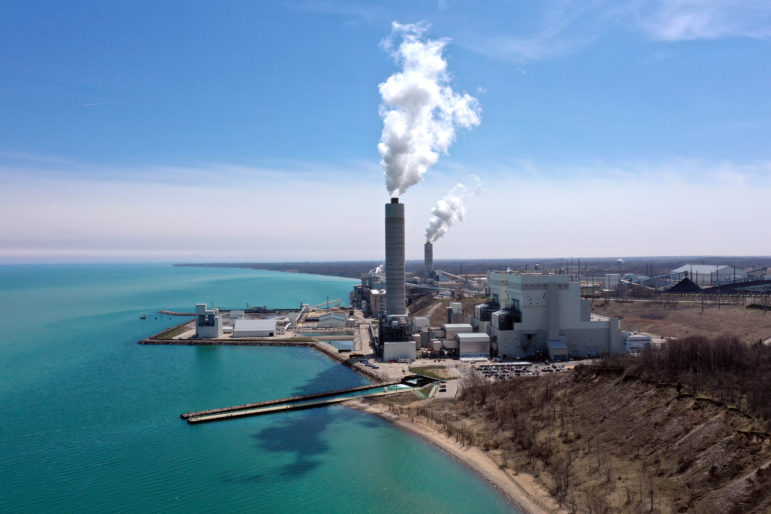Coal Must Go
The Governor’s Climate Task Force must stand up to utility executives.

Oak Creek Power Plant and Elm Road Generating Station. File photo by Coburn Dukehart/Wisconsin Watch.
“Fairness to utility companies.”
This became one of the concerns raised at the Governor’s Climate Task Force meeting on August 26 during a discussion about reducing carbon emissions and retiring coal plants as offered by Task Force member Robert Garvin, Executive Vice President of External Affairs for WEC Energy Group, the parent company of We Energies.
The task force must set goals that require utility companies to eliminate the use of fossil fuels and to close down Wisconsin’s eight remaining coal plants by 2030. We have only until 2030 to halt catastrophic climate change, according to the report from the UN Intergovernmental Panel on Climate Change and the consensus of the worldwide scientific community.
Utility representatives, including Garvin, continue to stall the process by generating rationales as to why their companies cannot meet these carbon reduction goals. At the August 26 Task Force meeting, Garvin claimed, “All utilities in the state have significant unrecovered balances on our coal fleet and as we transition to a cleaner energy future I guess I would say . . . we need a little more detail as to what the policies are that will help us find the right incentive and the right balance and some fairness for us and our customers.”
But is it fair to WEC’s customers for the utility to continue operating uneconomical coal plants that waste Wisconsinites’ money, pollute air and water, and accelerate climate change? Renewable energy is far cheaper than coal, and far better for our health and our planet since, by its very nature, it is sustainable.
Through its subsidiaries, We Energies and Wisconsin Public Service (WPS), WEC is deeply invested in two of the dirtiest and most uneconomic plants still operating in Wisconsin today — the South Oak Creek and Columbia coal-burning power plants. According to a Sierra Club report, last year, as part of the WEC Energy Group’s rate case, analysis showed that customers were paying (and continue to pay) millions of dollars to keep uneconomical coal plants running. Between 2014 and 2018 the South Oak Creek plant alone cost customers more than 75 million dollars per year more than if the utility had just bought energy from the open market. Retiring this coal plant would save Wisconsin customers money, reduce environmental harm, and free our communities from the devastating impacts of coal pollution. It is well documented that the air pollution from coal-burning plants contributes to more asthma, cancer, heart, lung and neurological problems. A study by Harvard University’s School of Public Health shows the coronavirus risk to be dramatically heightened for people living in the most heavily polluted areas.
The verdict is clear. In order to limit the worst impacts of climate change and reduce the economic burden and health consequences on all of us, we need rapid, ambitious action to replace all coal-based power in Wisconsin with clean energy by 2030.
WEC knows that it is not a question of “if”, but a question of “when” these plants will be retired. Even WEC’s corporate investors, like BlackRock, WEC’s second largest investor, have begun to scrutinize their portfolios in a significant move away from fossil fuel reliance.
Clearly, the Governor’s Climate Task Force must set bold goals to eliminate the use of fossil fuels and close down Wisconsin’s eight remaining coal plants by 2030. Wisconsin must move toward a healthy renewable energy future. Coal must go.
Susan Modder, Milwaukee, WI, is a Sierra Club member, volunteer with the Climate Reality Project Milwaukee WI and serves on the Executive Committee of the Clean Power Coalition of Southeast WI.
Op-Ed
-
Wisconsin Candidates Decry Money in Politics, Plan to Raise Tons of It
 Dec 15th, 2025 by Ruth Conniff
Dec 15th, 2025 by Ruth Conniff
-
Trump Left Contraceptives to Rot; Women Pay the Price
 Dec 8th, 2025 by Dr. Shefaali Sharma
Dec 8th, 2025 by Dr. Shefaali Sharma
-
Why the Common Council’s Amended Budget is Good Policy for Milwaukee
 Nov 20th, 2025 by Alds. Marina Dimitrijevic and Russell W. Stamper, II
Nov 20th, 2025 by Alds. Marina Dimitrijevic and Russell W. Stamper, II




















Coal is in a free-fall. An Illinois company just announced they’re shutting down 5 more plants after announcing 4 last year. WI utilities will be forced around eventually by $ alone. If they face the music sooner, maybe they can get some kind of bonding to help coving the closing costs. I expect basically every in-state coal plant to close by 2027/28 except Elm Road. If that one closes in that time frame too I will do a tap dance. It may be Scott Walkers worst legacy.
WI so far have been very NIMBY to wind. Solar on the other hand seems to be doing well. I do have hopes that the closed Kewanee nuclear station can become a off-shore wind farm/port – the infrastructure is all already there!
The utilities are wedded to the obscenely high guaranteed annual rates of return on their monopoly investments in generation and distribution infrastructure that have been awarded by the Public Service Commission. In a world in which U.S. treasury bonds are returning less than 1% annually, the utilities are getting 10-12% or more on their investments. They believe they should have no risk, with all of the burdens and risk on ratepayers. Obscene is actually far too gentle a word for what’s going on.